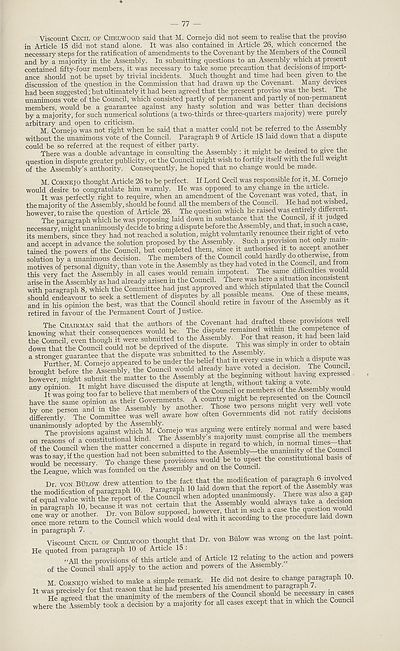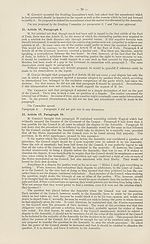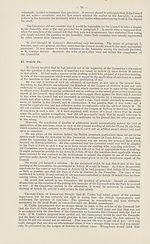Legal > Committee for the amendment of the Covenant of the League of Nations in order to bring it into harmony with the pact of Paris
(81)
Download files
Complete book:
Individual page:
Thumbnail gallery: Grid view | List view

Viscount Cecil of Cheewood said that M. Cornejo did not seem to realise that the proviso
in Article 15 did not stand alone. It was also contained in Article 26, which concerned the
necessary steps for the ratification of amendments to the Covenant by the Members of the Council
and by a majority in the Assembly. In submitting questions to an Assembly which at present
contained fifty-four members, it was necessary to take some precaution that decisions of import¬
ance should not be upset by trivial incidents. Much thought and time had been given to the
discussion of the question in the Commission that had drawn up the Covenant. Many devices
had been suggested; but ultimately it had been agreed that the present proviso was the best. The
unanimous vote of the Council, which consisted partly of permanent and partly of non-permanent
members, would be a guarantee against any hasty solution and was better than decisions
by a majority, for such numerical solutions (a two-thirds or three-quarters majority) were purely
arbitrary and open to criticism. r 1 .
M. Cornejo was not right when he said that a matter could not be referred to the Assembly
without the unanimous vote of the Council. Paragraph 9 of Article 15 laid down that a dispute
could be so referred at the request of either party. , .
There was a double advantage in consulting the Assembly : it might be desired to give the
question in dispute greater publicity, or the Council might wish to fortify itself with the full weight
of the Assembly’s authority. Consequently, he hoped that no change would be made.
M. Cornejo thought Article 26 to be perfect. If Cord Cecil was responsible for it, M. Cornejo
would desire to congratulate him warmly. He was opposed to any change m the article. _
It was perfectly right to require, when an amendment of the Covenant was voted, that, m
the majority of the Assembly, should be found all the members of the Council. He had not wished,
however, to raise the question of Article 26. The question which he raised was entirely different
The paragraph which he was proposing laid down in substance that the Council, it it judged
necessary, might unanimously decide to bring a dispute before the Assembly, and that, in such a case,
its members, since they had not reached a solution, might voluntarily renounce their right o± veto
and accept in advance the solution proposed by the Assembly. _ Such a provision not only main¬
tained the powers of the Council, but completed them, since it authorised it to accept another
solution by a unanimous decision. The members of the Council could hardly do otherwise fro
motives of personal dignity, than vote in the Assembly as they had voted m the Council and from
this verv fact the Assembly in all cases would remain impotent. The same difficulties wou d
arise inThe Assembly as had already arisen in the Council. There was here ^^w'the Coundl
with paragraph 8, which the Committee had just approved and which stipuiated that the (^uncf
should endeavour to seek a settlement of disputes by all possible means Cne°f these means
and in his opinion the best, was that the Council should retire m favour of the Assembly as it
retired in favour of the Permanent Court of Justice.
The Chairman said that the authors of the Covenant had drafted these provisions well
knowing what their consequences would be. The dispute remained within the competence of
the Council even though it were submitted to the Assembly. For that reason it had bwm bud.
downZt the Council lould not be deprived of the dispute. This was simply in order to obtain
a stronger euarantee that the dispute was submitted to the Assembly.
Further M Cornejo appeared to be under the belief that m every case m which a dispute was
brought before the Asiembly, the Council would already have voted a decision. The Council
however might submit the matter to the Assembly at the beginning without having expressed
any onTnion It might have discussed the dispute at length without taking a vote.
y It was going tooSfar to believe that members of the Council or members of the Assembly wou d
have tlTe same optaion as their Governments. A country might be represented on the Council
nave tne same opinion a another. Those two persons might very well vote
dfffe0rentlyrSOThenCommittee was well aware how often Governments did not ratify decisions
unanimously adopted by the^hich M ^ornej0 was arguing were entirely normal and were based
I he provisions again ... Accpmhlv’s maioritv must comprise all the members
the Teague, which was founded on the Assembly and on the Counc .
nr vrrn Ptttow drew attention to the fact that the modification of paragraph 6 involved
. ■Dr- ^ON . ^ Paravranh 10 laid down that the report of the Assembly was
the modification of paragrap • P S P h adopted unanimously. There was also a gap
of equal va^e^lt^^Pt°^af ^ certain that the Assembly would always take a decision
m paragraph 10 because ^ was d hoWeVer, that in such a case the question would
“or^tutTo tb^cZeU wZhTouZdeal with it according to the procedure laid down
in paragraph 7.
Viscount Cecil of Chelwood thought that Dr. von Billow was wrong on the last point.
He quoted from paragraph 10 of Article 15 :
“All the provisions of this article and of Article 12 relating to the action and powers
of the Council shall apply to the action and powers of the Assembly.
M. Cornejo wished to make a simple remark. He did not desire to change paragraph 10.
It was nreciselv for that reason that he had presented his amendment to paragraph 7.
HePalreed that the unanimity of the members of the Council should be necessary m cases
where theSAssembly took a decision by a majority for all cases except that m which the Counci
in Article 15 did not stand alone. It was also contained in Article 26, which concerned the
necessary steps for the ratification of amendments to the Covenant by the Members of the Council
and by a majority in the Assembly. In submitting questions to an Assembly which at present
contained fifty-four members, it was necessary to take some precaution that decisions of import¬
ance should not be upset by trivial incidents. Much thought and time had been given to the
discussion of the question in the Commission that had drawn up the Covenant. Many devices
had been suggested; but ultimately it had been agreed that the present proviso was the best. The
unanimous vote of the Council, which consisted partly of permanent and partly of non-permanent
members, would be a guarantee against any hasty solution and was better than decisions
by a majority, for such numerical solutions (a two-thirds or three-quarters majority) were purely
arbitrary and open to criticism. r 1 .
M. Cornejo was not right when he said that a matter could not be referred to the Assembly
without the unanimous vote of the Council. Paragraph 9 of Article 15 laid down that a dispute
could be so referred at the request of either party. , .
There was a double advantage in consulting the Assembly : it might be desired to give the
question in dispute greater publicity, or the Council might wish to fortify itself with the full weight
of the Assembly’s authority. Consequently, he hoped that no change would be made.
M. Cornejo thought Article 26 to be perfect. If Cord Cecil was responsible for it, M. Cornejo
would desire to congratulate him warmly. He was opposed to any change m the article. _
It was perfectly right to require, when an amendment of the Covenant was voted, that, m
the majority of the Assembly, should be found all the members of the Council. He had not wished,
however, to raise the question of Article 26. The question which he raised was entirely different
The paragraph which he was proposing laid down in substance that the Council, it it judged
necessary, might unanimously decide to bring a dispute before the Assembly, and that, in such a case,
its members, since they had not reached a solution, might voluntarily renounce their right o± veto
and accept in advance the solution proposed by the Assembly. _ Such a provision not only main¬
tained the powers of the Council, but completed them, since it authorised it to accept another
solution by a unanimous decision. The members of the Council could hardly do otherwise fro
motives of personal dignity, than vote in the Assembly as they had voted m the Council and from
this verv fact the Assembly in all cases would remain impotent. The same difficulties wou d
arise inThe Assembly as had already arisen in the Council. There was here ^^w'the Coundl
with paragraph 8, which the Committee had just approved and which stipuiated that the (^uncf
should endeavour to seek a settlement of disputes by all possible means Cne°f these means
and in his opinion the best, was that the Council should retire m favour of the Assembly as it
retired in favour of the Permanent Court of Justice.
The Chairman said that the authors of the Covenant had drafted these provisions well
knowing what their consequences would be. The dispute remained within the competence of
the Council even though it were submitted to the Assembly. For that reason it had bwm bud.
downZt the Council lould not be deprived of the dispute. This was simply in order to obtain
a stronger euarantee that the dispute was submitted to the Assembly.
Further M Cornejo appeared to be under the belief that m every case m which a dispute was
brought before the Asiembly, the Council would already have voted a decision. The Council
however might submit the matter to the Assembly at the beginning without having expressed
any onTnion It might have discussed the dispute at length without taking a vote.
y It was going tooSfar to believe that members of the Council or members of the Assembly wou d
have tlTe same optaion as their Governments. A country might be represented on the Council
nave tne same opinion a another. Those two persons might very well vote
dfffe0rentlyrSOThenCommittee was well aware how often Governments did not ratify decisions
unanimously adopted by the^hich M ^ornej0 was arguing were entirely normal and were based
I he provisions again ... Accpmhlv’s maioritv must comprise all the members
the Teague, which was founded on the Assembly and on the Counc .
nr vrrn Ptttow drew attention to the fact that the modification of paragraph 6 involved
. ■Dr- ^ON . ^ Paravranh 10 laid down that the report of the Assembly was
the modification of paragrap • P S P h adopted unanimously. There was also a gap
of equal va^e^lt^^Pt°^af ^ certain that the Assembly would always take a decision
m paragraph 10 because ^ was d hoWeVer, that in such a case the question would
“or^tutTo tb^cZeU wZhTouZdeal with it according to the procedure laid down
in paragraph 7.
Viscount Cecil of Chelwood thought that Dr. von Billow was wrong on the last point.
He quoted from paragraph 10 of Article 15 :
“All the provisions of this article and of Article 12 relating to the action and powers
of the Council shall apply to the action and powers of the Assembly.
M. Cornejo wished to make a simple remark. He did not desire to change paragraph 10.
It was nreciselv for that reason that he had presented his amendment to paragraph 7.
HePalreed that the unanimity of the members of the Council should be necessary m cases
where theSAssembly took a decision by a majority for all cases except that m which the Counci
Set display mode to:
![]() Universal Viewer |
Universal Viewer | ![]() Mirador |
Large image | Transcription
Mirador |
Large image | Transcription
Images and transcriptions on this page, including medium image downloads, may be used under the Creative Commons Attribution 4.0 International Licence unless otherwise stated. ![]()
| League of Nations > Legal > Committee for the amendment of the Covenant of the League of Nations in order to bring it into harmony with the pact of Paris > (81) |
|---|
| Permanent URL | https://digital.nls.uk/191509865 |
|---|
| Shelfmark | LN.V |
|---|
| Description | Over 1,200 documents from the non-political organs of the League of Nations that dealt with health, disarmament, economic and financial matters for the duration of the League (1919-1945). Also online are statistical bulletins, essential facts, and an overview of the League by the first Secretary General, Sir Eric Drummond. These items are part of the Official Publications collection at the National Library of Scotland. |
|---|---|
| Additional NLS resources: |
|

